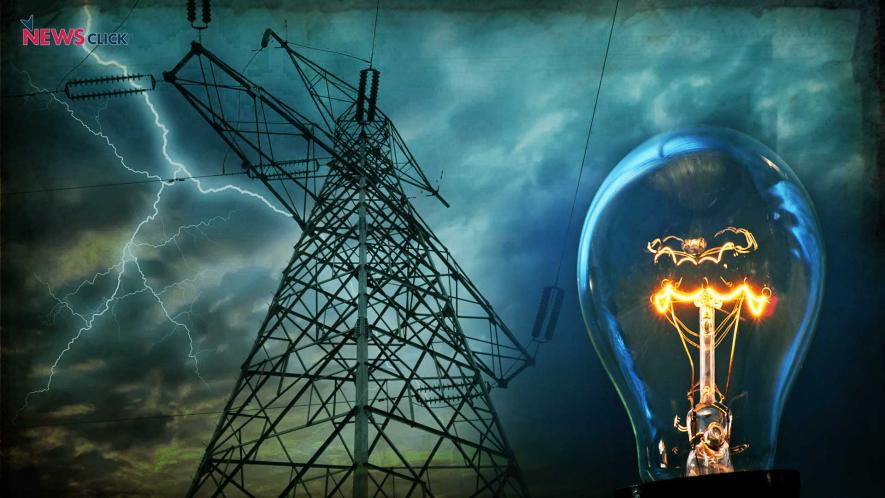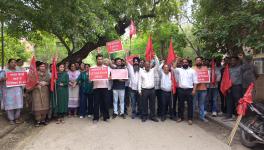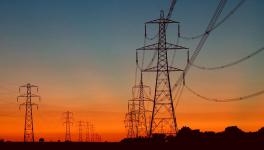New Electricity Law Ignites Angry Protests

Newsclick Image by Nitesh Kumar
There is widespread protest and anger, led by the electricity employees’ unions all over India, at the govt. plan to reintroduce the Electricity (Amendment) Bill 2014 in the upcoming winter session of Parliament.
The Bill, which seeks to replace the Electricity Act 2003, wants to bifurcate the distribution of power into carrying and sale, with the state laying down the wires that carry power, while private companies compete over selling that power.
Most experts and electricity unions say that it is a further step towards reduction of the state’s role to a mere enabler of private profit. In effect, the Bill seeks to privatise the profits while nationalising the losses.
On October 17, the National Coordination Committee of Electricity Employees and Engineers (NCCOEEE) – a broad-based platform of unions and national federations of electricity workers and engineers – had written to Union power minister RK Singh opposing the Bill. They demanded that the proposed amendments be discussed with all stakeholders before the government introduced it in Parliament again.
“The Bill is curbing the right to electricity of poor people. While the interests of the large-scale profitable consumers will be taken care of, the small-time consumers and the poor will be left in the lurch,” said Prasanta N Chowdhury, who is the general secretary of the Electricity Employees’ Federation of India and convener of NCCOEEE, speaking to Newsclick.
“The government had earlier assured us that it will resume discussions and develop a consensus addressing our concerns. We will make sure that it listens to us,” he said.
On October 21, the All India Power Engineers Federation (AIPEF) also sent a letter to the Union power ministry, similarly urging the Centre to discuss the implications of the amendments.
AN Rajan, additional general secretary of the All India Federation of Electricity Employees, said, “The intention of the Bill is total privatisation of distribution while protecting the big monopoly companies. When the Bill is implemented, the electricity charges for ordinary consumers will be increased. At the same time, big consumer units will get power at reduced rates. Another impact is that it will lead to reduction of the workforce in the sector.”
Unions have been opposing the Bill since it was introduced in 2014. Many state governments had also opposed the Bill when it was first tabled in Parliament.
In November 2015, a massive protest demonstration was organised by electricity unions in front of the venue of the Power Ministers’ Conference in Kochi. The then-Power Minister Piyush Goyal had to concede to meeting the unions and assured them of sorting out their issues with the Bill. However, no further action was taken in this regard by the Centre.
The Electricity Act 2003 had dismantled the State Electricity Boards, which were set up as integrated public-sector power utilities under the Electricity (Supply) Act 1948. It had trifurcated the electricity boards into three separate entities catering to generation, transmission and distribution. This was in keeping with the World Bank model of “unbundling” of the power sector, allowing private entry into the safer and more profitable aspects.
As a result, a large number of private companies entered power generation, even as transmission and distribution remained with the state governments – except for Odisha and Delhi, where distribution was also privatised, and where it failed spectacularly. Although some states, such as Himachal Pradesh, had resisted the unbundling, Kerala is the only state that has not trifurcated its electricity board.
The new Bill envisages a further separation of the distribution function into carriage (the distribution network carrying the electricity to consumers) and supply (or the sale of electricity to consumers). The Bill introduces multiple supply licensees who would be supplying electricity, and consumers can choose whom to buy electricity from. One of the supply licensees has to be a government-owned licensee.
Electricity unions have rightly pointed out that the private companies would only compete for supplying power to the large, high-paying and thus profitable consumers, such as industrial units and commercial establishments, where as small-time consumers that are not profitable, such as rural households and small shops, will be left to the state.
The state-owned distribution companies have already borne losses over Rs 3.8 lakh crore, because they have no control over the cost of generation. Much of private generation takes place with the help of bank loans and private owners have been creating profits with various types of shenanigans. The ultimate losers are the govt. and the consumers in this game. This Bill would further deepen the crisis.
Get the latest reports & analysis with people's perspective on Protests, movements & deep analytical videos, discussions of the current affairs in your Telegram app. Subscribe to NewsClick's Telegram channel & get Real-Time updates on stories, as they get published on our website.
























